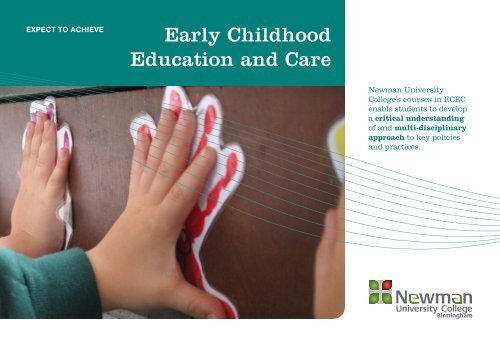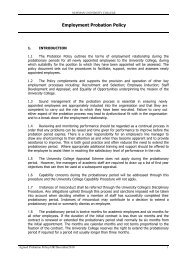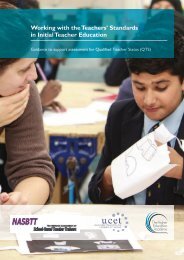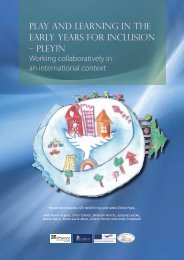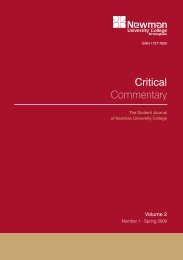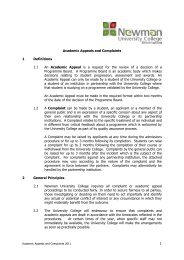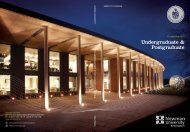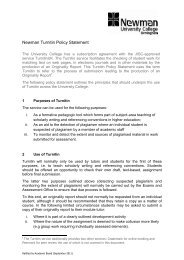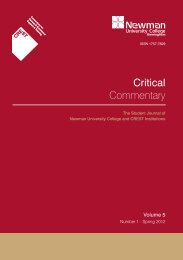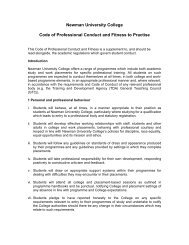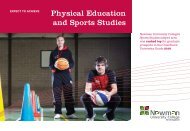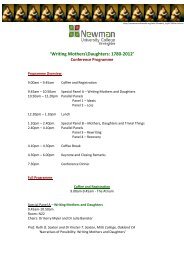Early Childhood Education and Care - Newman University College
Early Childhood Education and Care - Newman University College
Early Childhood Education and Care - Newman University College
Create successful ePaper yourself
Turn your PDF publications into a flip-book with our unique Google optimized e-Paper software.
EXPECT TO ACHIEVE<br />
<strong>Early</strong> <strong>Childhood</strong><br />
<strong>Education</strong> <strong>and</strong> <strong>Care</strong><br />
<strong>Newman</strong> <strong>University</strong><br />
<strong>College</strong>’s courses in ECEC<br />
enable students to develop<br />
a critical underst<strong>and</strong>ing<br />
of <strong>and</strong> multi-disciplinary<br />
approach to key policies<br />
<strong>and</strong> practices.
02 <strong>Early</strong> <strong>Childhood</strong> <strong>Education</strong> <strong>and</strong> <strong>Care</strong> | <strong>Newman</strong> <strong>University</strong> <strong>College</strong>
Why study <strong>Early</strong> <strong>Childhood</strong> <strong>Education</strong> <strong>and</strong> <strong>Care</strong> at <strong>Newman</strong><br />
<strong>University</strong> <strong>College</strong>? It is widely recognised in research that the<br />
care <strong>and</strong> development of young children plays an important role<br />
in their life opportunities. Fundamental skills such as speaking<br />
<strong>and</strong> listening, creativity <strong>and</strong> interpersonal skills are developed<br />
in this important phase of our lives.<br />
<strong>Newman</strong>’s courses in <strong>Early</strong> <strong>Childhood</strong> <strong>Education</strong><br />
<strong>and</strong> <strong>Care</strong> at undergraduate <strong>and</strong> postgraduate level<br />
<strong>and</strong> the <strong>Early</strong> Years Foundation Degree enable<br />
students to develop a critical underst<strong>and</strong>ing of<br />
<strong>and</strong> multi-disciplinary approach to key policies<br />
<strong>and</strong> practices locally, nationally <strong>and</strong> internationally<br />
relating to the care <strong>and</strong> education of children from<br />
birth to eight years of age.<br />
All courses promote a research informed approach<br />
to early childhood education <strong>and</strong> care in both<br />
theoretical <strong>and</strong> applied contexts. Often full <strong>and</strong><br />
part-time students from a variety of professional<br />
backgrounds study alongside each other, resulting<br />
in stimulating discussions of how policies <strong>and</strong><br />
strategies impact on various settings. This enables<br />
students to gain an underst<strong>and</strong>ing of multi-agency<br />
working <strong>and</strong> improve the efficiency of the<br />
organisations they work in.<br />
<strong>Early</strong> <strong>Childhood</strong> <strong>Education</strong> <strong>and</strong> <strong>Care</strong> graduates<br />
have opportunities to become part of a changing<br />
professional workforce which is interdisciplinary,<br />
<strong>and</strong> encompasses early childhood, education<br />
<strong>and</strong> care in all its diverse aspects. Most graduates<br />
pursue careers in the fields of education, health,<br />
legal <strong>and</strong> social work in the public, private <strong>and</strong><br />
voluntary sectors. Many are employed in children’s<br />
centres in diverse roles such as early years<br />
co-ordinators or family support workers. Others<br />
progress onto teacher education, either through<br />
a PGCE offered by <strong>Newman</strong> or employer based<br />
routes. There are also postgraduate professional<br />
training courses in youth work available for<br />
progression. The research based element of<br />
<strong>Newman</strong>’s programmes equips graduates for<br />
further research beyond their studies.<br />
Contents<br />
<strong>Early</strong> Years (non-school settings) Foundation Degree 04<br />
<strong>Early</strong> <strong>Childhood</strong> <strong>Education</strong> <strong>and</strong> <strong>Care</strong> BA (Hons) 06<br />
Initial Teacher <strong>Education</strong> BA (Hons) with QTS<br />
– <strong>Early</strong> Years Specialism 08<br />
PGCE Primary (QTS) 10<br />
MA <strong>Early</strong> Years 12<br />
Student Profiles 13<br />
Children, Young People <strong>and</strong> Families<br />
Research Centre 14<br />
Staff Profiles <strong>and</strong> Research Interests 15<br />
For more information visit our website:<br />
www.newman.ac.uk<br />
<strong>Newman</strong> <strong>University</strong> <strong>College</strong> | <strong>Early</strong> <strong>Childhood</strong> <strong>Education</strong> <strong>and</strong> <strong>Care</strong><br />
03
<strong>Early</strong> Years (non-school settings)<br />
Foundation Degree<br />
04 <strong>Early</strong> <strong>Childhood</strong> <strong>Education</strong> <strong>and</strong> <strong>Care</strong> | <strong>Newman</strong> <strong>University</strong> <strong>College</strong>
<strong>Newman</strong>’s <strong>Early</strong> Years (non-school settings)<br />
Foundation Degree is a Children’s Workforce<br />
<strong>and</strong> Development Council (CWDC) sector<br />
endorsed programme, designed for<br />
practitioners working with young children in<br />
public, private, voluntary <strong>and</strong> independent<br />
childcare <strong>and</strong> education settings.<br />
It provides access to a higher level qualification<br />
<strong>and</strong> career development for people working<br />
as childminders or in group settings such as a<br />
nursery, kindergarten, preschool, community<br />
crèche environment or children’s centres.<br />
The programme develops professional skills,<br />
knowledge <strong>and</strong> underst<strong>and</strong>ing within the field<br />
of childhood. Being sector endorsed, the<br />
course has been developed in consultation with<br />
a range of practitioners <strong>and</strong> experts to ensure<br />
the curriculum provides students with the<br />
knowledge, underst<strong>and</strong>ing <strong>and</strong> skills necessary<br />
to work at Assistant Senior Practitioner level.<br />
This course is for any practitioner, working<br />
with young children in a public, private,<br />
third or independent sector setting who has<br />
a commitment to the aims of the course. It<br />
has been designed for those with relevant<br />
experience of working in the sector, as well<br />
as for those seeking progression routes into<br />
management positions in early years settings.<br />
Modules<br />
Core topics include:<br />
• The Independent Learner<br />
• Child Development<br />
• Enabling <strong>Early</strong> Learning<br />
• Supporting Transitions<br />
• Constructs of <strong>Childhood</strong><br />
• Agencies Working with Young Children<br />
• Assessing Development<br />
• Working with Children & Families<br />
• Leading <strong>and</strong> Managing an <strong>Early</strong> Years Team<br />
• Play <strong>and</strong> the <strong>Early</strong> Years Curriculum<br />
• Research Methods.<br />
These modules may be subject to change.<br />
Entry Requirements<br />
You will need a level 3 qualification <strong>and</strong> at<br />
least two years experience in an appropriate<br />
setting is normally required. Please visit<br />
www.newman.ac.uk/entry for the latest<br />
information.<br />
Attendance<br />
You will attend taught sessions at <strong>Newman</strong> for<br />
one twilight <strong>and</strong> one evening session per week<br />
during term-time.<br />
Assessment<br />
A range of work-based assessment strategies<br />
will be used including portfolios, presentations,<br />
written reports <strong>and</strong> essays. There will also be<br />
directed study tasks regularly undertaken in<br />
your own time.<br />
Progression Routes<br />
After successful completion you may go on to<br />
the final year of a relevant degree programme,<br />
such as the <strong>Early</strong> <strong>Childhood</strong> <strong>Education</strong> <strong>and</strong><br />
<strong>Care</strong> BA (Hons), see page 6.<br />
For more information visit our website:<br />
www.newman.ac.uk<br />
<strong>Newman</strong> <strong>University</strong> <strong>College</strong> | <strong>Early</strong> <strong>Childhood</strong> <strong>Education</strong> <strong>and</strong> <strong>Care</strong><br />
05
<strong>Early</strong> <strong>Childhood</strong> <strong>Education</strong><br />
<strong>and</strong> <strong>Care</strong> BA (Hons)<br />
Full <strong>and</strong> part-time routes<br />
06 <strong>Early</strong> <strong>Childhood</strong> <strong>Education</strong> <strong>and</strong> <strong>Care</strong> | <strong>Newman</strong> <strong>University</strong> <strong>College</strong>
<strong>Early</strong> childhood, the quality of education,<br />
provision <strong>and</strong> care, <strong>and</strong> the roles <strong>and</strong><br />
responsibilities of all those involved with young<br />
children, parents <strong>and</strong> families, all have a<br />
significant influence on children’s achievement<br />
<strong>and</strong> life chances. The last decade has seen the<br />
wider development of early years provision,<br />
changes <strong>and</strong> challenges in aspects of education<br />
<strong>and</strong> care, <strong>and</strong> the recognition that early<br />
childhood <strong>and</strong> children’s experiences must be<br />
supported by a highly qualified workforce.<br />
The <strong>Early</strong> <strong>Childhood</strong> <strong>Education</strong> <strong>and</strong> <strong>Care</strong><br />
(ECEC) degree promotes a critical approach<br />
to all aspects of childhood, children, their care<br />
<strong>and</strong> education, in local, national <strong>and</strong> global<br />
contexts. Recent changes in children’s services<br />
in Engl<strong>and</strong> have established the requirement<br />
for higher level qualifications <strong>and</strong> continuing<br />
professional development for those working in<br />
early childhood education <strong>and</strong> care related work.<br />
The ECEC programme is multi-disciplinary;<br />
it draws on aspects of philosophy, sociology,<br />
psychology <strong>and</strong> education studies.<br />
Part-time Route<br />
<strong>Newman</strong> recognises the importance of providing<br />
opportunities to all students with the ability to<br />
benefit from a university education. Therefore,<br />
we have developed a part-time Single Honours<br />
degree route in <strong>Early</strong> <strong>Childhood</strong> <strong>Education</strong> <strong>and</strong><br />
<strong>Care</strong>. Studied over 4 years instead of 3 years,<br />
part-time study is a cost effective solution to<br />
gaining your degree as the flexibility it offers will<br />
provide you with the opportunity to combine<br />
paid employment with study. You will continue<br />
to study alongside full-time students <strong>and</strong> will<br />
benefit from the same academic expertise.<br />
A key feature of the <strong>Early</strong> <strong>Childhood</strong> <strong>Education</strong><br />
<strong>and</strong> <strong>Care</strong> degree is a compulsory work-related<br />
str<strong>and</strong>. Both work placements <strong>and</strong> taught<br />
modules link study with employability skills <strong>and</strong><br />
the needs of society at large. The compulsory<br />
work placement will equip you<br />
with valuable practical experience <strong>and</strong> ensure<br />
you graduate with the transferable skills<br />
employers dem<strong>and</strong>.<br />
• Modules are assessed in a variety of modes<br />
such as individual presentations, reports, poster<br />
presentations <strong>and</strong> essays. There are no exams<br />
• The ECEC staff team have varied professional<br />
backgrounds, which reflect the move to interprofessional<br />
working in children’s services.<br />
Professional qualifications include social<br />
work, nursing, primary teacher, <strong>and</strong> Special<br />
<strong>Education</strong>al Needs support teacher<br />
• The course now reflects changes in the field<br />
of children’s services. It has been designed<br />
with four key str<strong>and</strong>s to promote a critical<br />
awareness of key issues related to: diversity<br />
<strong>and</strong> inclusion; policy; families <strong>and</strong> child<br />
development<br />
• ECEC can be studied as either a 3 year full-time<br />
or 4 years <strong>and</strong> 1 semester part-time course.<br />
Entry Requirements<br />
You will need a minimum of 260 UCAS points<br />
including at least two grade Cs or above at A2,<br />
or equivalent. Please visit www.newman.ac.uk/<br />
entry for the latest information.<br />
Indicative Modules<br />
• Equality, rights <strong>and</strong> diversity<br />
• Constructs of childhood<br />
• Families in the social context<br />
• Working with families in the community<br />
• Work-based case study<br />
• Inclusive practice<br />
• Research methodology <strong>and</strong> design<br />
• Safeguarding children<br />
• Social policy<br />
• Dissertation<br />
These modules may be subject to change.<br />
Special Features<br />
• Staff in the ECEC subject area are involved<br />
with international projects with Germany,<br />
Romania, Pol<strong>and</strong> <strong>and</strong> Hungary. You will<br />
be able to access resources related to the<br />
projects <strong>and</strong> these will assist with those<br />
modules that take global perspectives<br />
• You will undertake a work-based project at<br />
level 5. There is a wide range of placement<br />
opportunities, including international locations<br />
“The team on this programme<br />
provide a high quality student<br />
experience; they provide quality<br />
feedback to students.”<br />
External Examiner<br />
For more information visit our website:<br />
www.newman.ac.uk<br />
<strong>Newman</strong> <strong>University</strong> <strong>College</strong> | <strong>Early</strong> <strong>Childhood</strong> <strong>Education</strong> <strong>and</strong> <strong>Care</strong><br />
07
Initial Teacher <strong>Education</strong><br />
Primary with <strong>Early</strong> Years<br />
Specialism BA (Hons) with QTS<br />
08 <strong>Early</strong> <strong>Childhood</strong> <strong>Education</strong> <strong>and</strong> <strong>Care</strong> | <strong>Newman</strong> <strong>University</strong> <strong>College</strong>
The 3-7 age range is crucial in terms of<br />
children’s development <strong>and</strong> learning. It is at<br />
this formative, <strong>and</strong> particularly receptive, stage<br />
of development that many attitudes towards<br />
learning are formed.<br />
The specialist <strong>Early</strong> <strong>Childhood</strong> <strong>Education</strong><br />
modules have been created to ensure that you<br />
are challenged to think critically about this stage<br />
of learning, creatively responding to different<br />
pedagogies. You will be encouraged to rise to<br />
the challenge of meeting the range of needs<br />
of young children, developing knowledge,<br />
underst<strong>and</strong>ing <strong>and</strong> skills that will enable you<br />
to become an effective early years or primary<br />
practitioner.<br />
Module Information<br />
Through <strong>Early</strong> <strong>Childhood</strong> <strong>Education</strong>, Core<br />
Curriculum, Broad Curriculum <strong>and</strong> <strong>Education</strong>al<br />
<strong>and</strong> Professional Studies modules, you will<br />
develop a secure knowledge of the <strong>Early</strong> Years<br />
Foundation Stage <strong>and</strong> the Primary National<br />
Curriculum; <strong>and</strong> develop an underst<strong>and</strong>ing<br />
of progression through different age phases,<br />
including birth to three. The latest developments<br />
in education policy will provide an underpinning<br />
for your studies <strong>and</strong> time spent in schools<br />
<strong>and</strong>/or early years settings will enable you to<br />
observe experienced teachers <strong>and</strong> complement<br />
the knowledge, underst<strong>and</strong>ing <strong>and</strong> skills you<br />
develop, in lectures <strong>and</strong> seminars, in a practical<br />
<strong>and</strong> professional situation.<br />
School Experience<br />
Each year you will spend time in schools <strong>and</strong>/<br />
or <strong>Early</strong> Years settings. Your placement begins<br />
with preparation days <strong>and</strong> these are followed by<br />
a block placement. As the course progresses,<br />
you will gradually take greater responsibility for<br />
planning <strong>and</strong> delivering lessons <strong>and</strong> activities,<br />
<strong>and</strong> for managing children’s learning <strong>and</strong> the<br />
adults who support it.<br />
Special Features<br />
• You will be taught how to prepare, deliver <strong>and</strong><br />
evaluate sessions that will engage, motivate<br />
<strong>and</strong> inspire children<br />
• You will be encouraged to develop teamworking<br />
skills, essential for an integrated<br />
approach to learning <strong>and</strong> for work in a multiagency<br />
environment<br />
• Your assessment will comprise a combination<br />
of coursework, essays, presentations <strong>and</strong><br />
reports, as well as observed teaching in <strong>Early</strong><br />
Years settings<br />
• The four year route provides an opportunity to<br />
gain experience overseas or in an alternative<br />
educational setting<br />
• You will undertake specialist <strong>Early</strong> <strong>Childhood</strong><br />
<strong>Education</strong> modules.<br />
Entry Requirements<br />
You will need a minimum of 280-300 UCAS<br />
points including at least two grade Cs or<br />
above at A2, or equivalent. Please visit<br />
www.newman.ac.uk/entry for the latest<br />
information.<br />
Recent <strong>and</strong> relevant work experience in a<br />
British state school prior to being shortlisted<br />
is required. We do not require a specific<br />
amount of time in school, however, the quality<br />
<strong>and</strong> variety of your personal statement is an<br />
important factor in the decision whether to<br />
shortlist you for tests <strong>and</strong> interview. Shortlisted<br />
c<strong>and</strong>idates must attend an interview <strong>and</strong><br />
pass literacy <strong>and</strong> numeracy tests at <strong>Newman</strong><br />
<strong>University</strong> <strong>College</strong>.<br />
Criminal Records Bureau (CRB) clearance,<br />
meeting the requirements for capacity to teach<br />
<strong>and</strong> General Teaching Clearance provisional<br />
registration (Suitability to Teach Declaration)<br />
are also required.<br />
“The university’s partnership<br />
with both early years <strong>and</strong><br />
primary settings is particularly<br />
well developed.”<br />
External Examiner<br />
For more information visit our website:<br />
www.newman.ac.uk<br />
<strong>Newman</strong> <strong>University</strong> <strong>College</strong> | <strong>Early</strong> <strong>Childhood</strong> <strong>Education</strong> <strong>and</strong> <strong>Care</strong><br />
09
PGCE Primary (QTS)<br />
10 <strong>Early</strong> <strong>Childhood</strong> <strong>Education</strong> <strong>and</strong> <strong>Care</strong> | <strong>Newman</strong> <strong>University</strong> <strong>College</strong>
<strong>Newman</strong> offers you two routes through the<br />
Primary PGCE course: ages 3-7 or 5-11. Both<br />
routes focus on the study of teaching in all<br />
National Curriculum subjects, with an emphasis<br />
on English, maths <strong>and</strong> science. The Primary<br />
Foundation Stage/Key Stage 1 course includes<br />
a specialist study of the early years foundation<br />
stage curriculum <strong>and</strong> the distinctive pedagogies<br />
encountered in reception/nursery classrooms<br />
<strong>and</strong> children’s centres. For both routes school<br />
placements will be completed in relevant age<br />
phases, including nursery <strong>and</strong> reception classes<br />
for students on the 3-7 age range course.<br />
Whichever route you take, you will learn the<br />
principles of curriculum design <strong>and</strong> delivery,<br />
<strong>and</strong> theories of learning <strong>and</strong> teaching, alongside<br />
developing practical insights <strong>and</strong> skills in the<br />
effective teaching <strong>and</strong> assessment of young<br />
children.<br />
The course is designed to enable you to<br />
meet the requirements for qualified teacher<br />
status (QTS) specified by the Training <strong>and</strong><br />
Development Agency for Schools (TDA).<br />
“...the students were confident<br />
<strong>and</strong> accomplished <strong>and</strong> a credit<br />
to the university.”<br />
External Examiner<br />
Primary Partnership<br />
The Primary PGCE course is based upon<br />
<strong>Newman</strong>’s strong partnership with a number<br />
of primary schools in the West Midl<strong>and</strong>s. You<br />
will be offered a series of training experiences<br />
linking different perspectives of primary teaching<br />
to the development of your practical skills in<br />
the classroom. Tutors are involved in both<br />
<strong>Newman</strong> based training <strong>and</strong> in supporting<br />
the professional development of students in<br />
partnership schools. Teachers are involved in the<br />
supervision of school experience <strong>and</strong> in teaching<br />
students how to make effective, critical <strong>and</strong><br />
reflective evaluations of their work.<br />
Course Content<br />
The PGCE year (from early September to the<br />
beginning of July) consists of 36 weeks full-time<br />
study, at least 18 of which are spent in schools.<br />
Taught sessions at <strong>Newman</strong> <strong>University</strong> <strong>College</strong><br />
are timetabled across two semesters without a<br />
half-term break.<br />
Teaching Experience<br />
School experience is central to the PGCE<br />
programme <strong>and</strong> is a feature of all three<br />
terms of the PGCE year. You undertake three<br />
placements in at least two primary schools<br />
providing opportunities to observe <strong>and</strong> practise<br />
contrasting methods <strong>and</strong> approaches. School<br />
experience includes observation of experienced<br />
teachers, a structured programme of group <strong>and</strong><br />
whole class teaching <strong>and</strong> a series of directed<br />
activities to explore whole school issues.<br />
Special Features<br />
• On the 5-11 route you may also undertake an<br />
optional Global Citizenship <strong>Education</strong> module<br />
which includes a self-funded field trip to The<br />
Gambia. This exciting addition to the course<br />
enables students to gain the skills to teach<br />
citizenship from an international perspective,<br />
thereby supporting schools’ promotion of<br />
community cohesion <strong>and</strong> gain an appreciation<br />
of another country’s education system<br />
• Assessment is by coursework <strong>and</strong> through<br />
the evaluation <strong>and</strong> monitoring of professional<br />
classroom competencies<br />
• You will have the option to study for the<br />
Catholic Certificate in Religious Studies<br />
(CCRS) to enable you to teach in Catholic<br />
schools.<br />
PGCE Primary courses are very popular <strong>and</strong><br />
can become full very quickly. C<strong>and</strong>idates are<br />
advised to apply through www.gttr.ac.uk as<br />
soon as possible after 1st September for course<br />
commencing the year after applying.<br />
Entry Requirements<br />
You will need a good Honours degree (2:1 or<br />
above), or a recognised equivalent qualification.<br />
Please visit www.newman.ac.uk/entry for<br />
the latest information. Recent <strong>and</strong> relevant<br />
work experience in a primary setting is also<br />
required.<br />
For more information visit our website:<br />
www.newman.ac.uk<br />
<strong>Newman</strong> <strong>University</strong> <strong>College</strong> | <strong>Early</strong> <strong>Childhood</strong> <strong>Education</strong> <strong>and</strong> <strong>Care</strong><br />
11
MA <strong>Early</strong><br />
Years<br />
This part-time postgraduate course has<br />
been specifically designed for early years<br />
professionals, <strong>and</strong> those who wish to develop<br />
their knowledge <strong>and</strong> underst<strong>and</strong>ing in the field<br />
of early childhood.<br />
The course will be of interest to experienced<br />
practitioners <strong>and</strong> managers working across<br />
the public, voluntary <strong>and</strong> private sectors.<br />
The programme will provide you with the<br />
opportunity to examine policy, research <strong>and</strong><br />
practice in early childhood education, provision<br />
<strong>and</strong> care. It will enable you to research specific<br />
topics <strong>and</strong> themes directly relevant to your<br />
work. You will be encouraged to develop your<br />
higher-level skills including critical analysis,<br />
research, evaluation of policy <strong>and</strong> practice,<br />
management <strong>and</strong> organisation, working with<br />
others <strong>and</strong> strategic thinking. It will encourage<br />
groups of professionals to study together to<br />
promote multi-agency working whilst enhancing<br />
learning <strong>and</strong> teaching experiences.<br />
The programme offers high quality<br />
professional development delivered by a<br />
range of experienced tutors, group <strong>and</strong><br />
individual support <strong>and</strong> the opportunity to<br />
work with professionals from diverse settings/<br />
organisations. There are opportunities for<br />
individuals <strong>and</strong> groups to undertake workfocused<br />
research.<br />
The MA in <strong>Early</strong> Years has been designed to<br />
be combined with work. You will normally take<br />
one module per semester. The programme<br />
is delivered through approximately 30 hours<br />
of contact time per module, normally lasting<br />
8 weeks. The sessions will be taught during<br />
late afternoon, evening <strong>and</strong> some weekend<br />
sessions.<br />
Teaching <strong>and</strong> learning will integrate a range<br />
of strategies including lectures, workshops,<br />
seminars, directed activities, group <strong>and</strong><br />
individual tutorials, discussion <strong>and</strong> debate,<br />
<strong>and</strong> the integration of e-learning. Assessment<br />
includes essays, evaluative reports, individual<br />
<strong>and</strong> group presentations, case studies,<br />
research reports <strong>and</strong> a dissertation. These<br />
strategies are also designed to enable the<br />
development of key transferable skills in the<br />
workplace. There are no examinations.<br />
Entry Requirements<br />
You will need a good Honours degree (2:2 or<br />
above), or equivalent professional experience.<br />
You will need to be able to demonstrate a<br />
commitment to developing <strong>and</strong> challenging<br />
early years practice <strong>and</strong> policy. Please visit<br />
www.newman.ac.uk/entry for the latest<br />
information.<br />
For more information visit our website:<br />
www.newman.ac.uk<br />
12<br />
<strong>Early</strong> <strong>Childhood</strong> <strong>Education</strong> <strong>and</strong> <strong>Care</strong> | <strong>Newman</strong> <strong>University</strong> <strong>College</strong>
Student<br />
Profiles<br />
“The graduate employment rate is also impressive <strong>and</strong> the fact that<br />
£20million is being invested in new learning facilities, including a<br />
new library shows how highly the students’ needs are regarded.”<br />
Scott Jezard<br />
Kamaljit Hayer<br />
<strong>Early</strong> <strong>Childhood</strong> <strong>Education</strong><br />
<strong>and</strong> <strong>Care</strong> BA (Hons)<br />
student<br />
Scott Jezard<br />
<strong>Early</strong> <strong>Childhood</strong> <strong>Education</strong><br />
<strong>and</strong> <strong>Care</strong> BA (Hons)<br />
student<br />
<strong>Early</strong> <strong>Childhood</strong> <strong>Education</strong> <strong>and</strong> <strong>Care</strong> gives you<br />
the opportunity to explore early year’s education<br />
for young children, which is recognised as being<br />
the foundation of their future learning. The theory<br />
side really helps to give an underst<strong>and</strong>ing of the<br />
background of early year’s education regarding<br />
where it has come from <strong>and</strong> how it plays a major<br />
role in today’s society. It is great when you can<br />
practice these theories during work placements. I<br />
thought it would be fascinating to see how children<br />
develop <strong>and</strong> gain knowledge, <strong>and</strong> to investigate the<br />
complex <strong>and</strong> dem<strong>and</strong>ing nature of education.<br />
The friendly approach of the <strong>University</strong> <strong>College</strong><br />
helps students to become more familiar with one<br />
another <strong>and</strong> gives a much more personal feeling,<br />
which helps when you are an undergraduate.<br />
I believe to be a good educator you have to<br />
underst<strong>and</strong> about all aspects of childhood, which<br />
is why the <strong>Early</strong> <strong>Childhood</strong> <strong>Education</strong> <strong>and</strong> <strong>Care</strong><br />
course at <strong>Newman</strong> is ideal. The course will give<br />
me the knowledge to be a better, more empathetic<br />
practitioner.<br />
I think the on-line debate forums are great - through<br />
this method you can keep track of points being<br />
made <strong>and</strong> also hear other students’ point of view.<br />
I also like the resources available to us; the library,<br />
the lecturers <strong>and</strong> <strong>Newman</strong>’s virtual learning<br />
tool - Moodle.<br />
I am also a student representative at <strong>Newman</strong><br />
<strong>University</strong> <strong>College</strong> <strong>and</strong> hope to help with ensuring<br />
the course satisfies everybody’s needs.<br />
<strong>Newman</strong> is in a great central location, quite a small<br />
<strong>University</strong> <strong>College</strong>, but I think this gives it a good<br />
sense of community <strong>and</strong> its harder to get lost! The<br />
graduate employment rate is also impressive <strong>and</strong><br />
the fact that £20million is being invested in new<br />
learning facilities, including a new library shows<br />
how highly the students’ needs are regarded.<br />
<strong>Newman</strong> <strong>University</strong> <strong>College</strong> | <strong>Early</strong> <strong>Childhood</strong> <strong>Education</strong> <strong>and</strong> <strong>Care</strong><br />
13
Children,<br />
Young People<br />
<strong>and</strong> Families<br />
Research Centre<br />
<strong>Early</strong> Years research is fundamental to the mission of<br />
<strong>Newman</strong> <strong>University</strong> <strong>College</strong>. The subject area welcomes<br />
applications from suitably qualified students who wish<br />
to pursue postgraduate research degrees.<br />
<strong>Newman</strong>’s commitment to research is further<br />
enhanced through the Children, Young People<br />
<strong>and</strong> Families Research Centre. Centre staff will<br />
work with community organisations, schools,<br />
children’s services, third sector organisations <strong>and</strong><br />
public bodies, both in the UK <strong>and</strong> abroad. Evidence<br />
gained from such research will directly contribute<br />
towards improving services, support change<br />
management processes <strong>and</strong> challenge dominant<br />
representations of family <strong>and</strong> community life.<br />
Examples of research work currently being carried<br />
out includes:<br />
• An EU funded research project involving<br />
partners in Germany <strong>and</strong> Romania looking<br />
at victims’ perceptions (women, children <strong>and</strong><br />
young people) of the quality of support offered<br />
when experiencing violence, neglect or are<br />
trafficked<br />
• EU funded research involving partners from<br />
Pol<strong>and</strong> <strong>and</strong> Romania exploring Play <strong>and</strong><br />
Learning in the <strong>Early</strong> Years for Inclusion - the<br />
‘PLEYIn project’.<br />
• Partner involvement in the ‘Crossing Borders’<br />
international research project exploring<br />
children’s play.<br />
Potential students interested in<br />
postgraduate research should contact:<br />
Professor Yahya Al-Nakeeb,<br />
Director of Research<br />
T: +44 (0) 121 476 1181 ext 2268<br />
E: y.al-nakeeb@newman.ac.uk<br />
14<br />
<strong>Early</strong> <strong>Childhood</strong> <strong>Education</strong> <strong>and</strong> <strong>Care</strong> | <strong>Newman</strong> <strong>University</strong> <strong>College</strong>
Staff Profiles<br />
<strong>and</strong> Research<br />
Interests<br />
Dr. Gill McGillivray<br />
Head of <strong>Early</strong> <strong>Childhood</strong>, Senior Lecturer<br />
in <strong>Early</strong> <strong>Childhood</strong><br />
• PhD thesis: Practitioner to professional: de/re-constructions of<br />
professional identity in the early years workforce<br />
• PLEYIn: Play <strong>and</strong> Learning in the <strong>Early</strong> years for Inclusion - EU<br />
Leonardo Lifelong Learning Partnership project in collaboration with<br />
partners in Sibiu, Romania <strong>and</strong> Sieradz, Pol<strong>and</strong>.<br />
Karen Argent<br />
Senior Lecturer in <strong>Early</strong> <strong>Childhood</strong><br />
• PhD research investigates what guides <strong>Early</strong> Years practitioner choices<br />
in their selection of picture books with a disability related theme<br />
• PLEYIn: Play <strong>and</strong> Learning in the <strong>Early</strong> years for Inclusion.<br />
Julie Boardman<br />
Senior Lecturer in <strong>Early</strong> <strong>Childhood</strong><br />
• Wellbeing in the context of Higher <strong>Education</strong><br />
• Child Development in the 21st Century.<br />
Jane Beniston<br />
Senior Lecturer in <strong>Early</strong> <strong>Childhood</strong><br />
• Young children’s problem solving skills<br />
• PLEYIn: Play <strong>and</strong> Learning in the <strong>Early</strong> years for Inclusion.<br />
Christine Collett<br />
Senior Lecturer in <strong>Early</strong> <strong>Childhood</strong><br />
• SEN, Disability <strong>and</strong> Inclusion<br />
• Behaviour Management<br />
• PLEYIn: Play <strong>and</strong> Learning in the <strong>Early</strong> years for Inclusion.<br />
Mark Cronin<br />
Senior Lecturer in <strong>Early</strong> <strong>Childhood</strong><br />
• Social Policy <strong>and</strong> the role of Men in ECEC<br />
• Safeguarding with a focus on Children in <strong>Care</strong> <strong>and</strong> <strong>Care</strong> Leavers.<br />
Dalvir Gill<br />
Senior Lecturer in <strong>Early</strong> <strong>Childhood</strong><br />
• Equality, Rights <strong>and</strong> Diversity<br />
• Listening to Children<br />
• Parental partnership policy<br />
• Community Cohesion <strong>and</strong> Social Inclusion.<br />
Dr. Teresa Harms<br />
Programme Co-ordinator for MA <strong>Early</strong> Years,<br />
Senior Lecturer in <strong>Early</strong> <strong>Childhood</strong><br />
• Research into the everyday lives of children <strong>and</strong> families<br />
• The Sociology of <strong>Childhood</strong> <strong>and</strong> the Family<br />
• Demography <strong>and</strong> social change<br />
• Research design <strong>and</strong> methods.<br />
Deborah Harris<br />
Senior Lecturer in <strong>Early</strong> <strong>Childhood</strong><br />
• PLEYIn: Play <strong>and</strong> Learning in the <strong>Early</strong> years for Inclusion<br />
• Music <strong>and</strong> how this supports children’s language development.<br />
Deborah Steele<br />
Senior Lecturer in <strong>Early</strong> <strong>Childhood</strong><br />
• Background in public health <strong>and</strong> child health<br />
• Arts <strong>and</strong> Health <strong>and</strong> Health Promotion<br />
• How the arts can affect attitudinal <strong>and</strong> behavioural change in health<br />
promotion to children <strong>and</strong> young people.<br />
Allison Tatton<br />
Senior Lecturer in <strong>Early</strong> <strong>Childhood</strong>, Programme<br />
Leader for Teaching <strong>and</strong> Learning Support<br />
Assistants Foundation Degree<br />
• Families who foster<br />
• Development of early literacy skills<br />
• PLEYIn: Play <strong>and</strong> Learning in the <strong>Early</strong> years for Inclusion.<br />
Linda Treadwell<br />
Programme Co-ordinator for <strong>Early</strong> Years<br />
(non-school settings) Foundation Degree,<br />
Senior Lecturer in <strong>Early</strong> <strong>Childhood</strong><br />
• Sociological constructions of childhood<br />
• Children’s early learning.<br />
Prof. Margaret Clark<br />
Visiting Professor in <strong>Early</strong> <strong>Childhood</strong><br />
• Left-h<strong>and</strong>edness<br />
• Literacy <strong>and</strong> <strong>Early</strong> Years <strong>Education</strong>.<br />
Dr. Kehinde Andrews<br />
Lecturer in <strong>Childhood</strong> <strong>and</strong> <strong>Early</strong> <strong>Childhood</strong> Studies<br />
• How racism in the education system manifests in schooling policy<br />
• Black supplementary schools, organised with African <strong>and</strong><br />
Caribbean communities<br />
• Redefining the concept of Blackness so that it can used as a<br />
resource for African <strong>and</strong> Caribbean families in order to overcome<br />
racial discrimination.<br />
<strong>Newman</strong> <strong>University</strong> <strong>College</strong> | <strong>Early</strong> <strong>Childhood</strong> <strong>Education</strong> <strong>and</strong> <strong>Care</strong><br />
15
EXPECT TO ACHIEVE<br />
<strong>Early</strong> <strong>Childhood</strong><br />
<strong>Education</strong> <strong>and</strong> <strong>Care</strong><br />
Contact the School Office for more<br />
information on any of the programmes<br />
detailed in this brochure.<br />
T: 0121 476 1181<br />
E: info.earlyyears@newman.ac.uk<br />
www.newman.ac.uk


